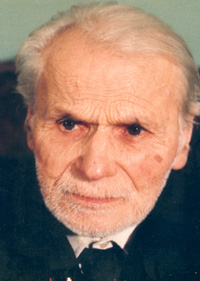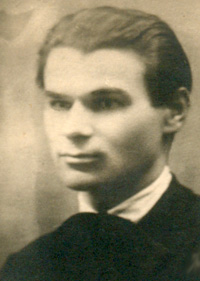Lasgush PORADECI

Lasgush Poradeci (1899-1987) had lived the final years of his life in his beloved town of Pogradec on Lake Ohrid, not far from the Macedonian border, tending his garden and studying the ever-changing moods of the lake. The rhythmic and gentle lapping of the waves had always been among the fundamental sources of his pantheistic verse.
Poradeci, pseudonym of Llazar Gusho, was born in Pogradec on 27 December 1899 - being only three or four days older than the twentieth century, as he once remarked. He attended a Romanian-language school in Monastir (Bitola), Macedonia, from 1909 to 1916. In the middle of the First World War, his father, despite the tenuous relations between Albanians and Greeks in southeastern Albania at the time, sent the adolescent Llazar to Greece to continue his schooling, on the condition that he not study at a Greek-language institution. Llazar therefore enrolled at the French-language Lycée des Frères Maristes in Athens where he remained until 1920. For health reasons, however, the last two years of his stay in the Greek capital were spent not at school but in a sanatorium to which, despite his desperate financial situation, he was referred with the assistance of Sophia Schliemann, widow of the famed German archaeologist, Heinrich Schliemann (1822-1890). Although not completely recovered, the twenty-year-old Llazar was expelled from the sanatorium prematurely in 1920 after having been caught in flagranti with a nurse. The following year we find the budding poet in Bucharest, where he joined his brother. Llazar wanted to study at the Academy of Fine Arts, but registering proved to be difficult, since the Romanian government, in a wave of anti-semitism, had imposed restrictions on study by all non-Romanian nationals. After much tribulation, however, he succeeded in enrolling. The poet’s stay in Bucharest was to have a decisive influence on his literary development. It was here that he met and befriended the romantic poet Asdreni, whom he replaced as secretary of the Albanian colony in 1922, short story writer Mitrush Kuteli (1907-1967), and numerous Romanian writers and poets. He also began publishing verse in various Albanian-language periodicals: Shqipëri’ e re, an illustrated national weekly published in Constanza, and Dielli of Boston among others. His verse of this period was already revealing a certain theosophical affinity to the Romanian lyric poet Mihai Eminescu (1850-1889).
A scholarship provided by the Fan Noli government in 1924 enabled him to continue his studies abroad. Poradeci immediately left for Berlin, where he hoped to study under Austrian Albanologist Norbert Jokl (1877-1942). The chair appears to have been vacant at the time and Poradeci continued on to the University of Graz in southeastern Austria where he registered at the Faculty of Romance and Germanic philology. The poet spent a total of ten years in Graz which he counted as the most enjoyable of his life. In May 1933 he finished his doctorate there with a dissertation on Der verkannte Eminescu und seine volkstümlich-heimatliche Ideologie (The unappreciated Eminescu and his native folk ideology). The following year, Poradeci returned to Albania and taught art at a secondary school in Tirana where he remained during the war. From 1944 until 1947, the first turbulent years of communist rule, he was unemployed, and lived with his wife in Tirana on the latter’s meagre salary as a teacher. After brief employment at the Institute of Science, forerunner of the University of Tirana, he got a job translating literature for the state-owned Naim Frashëri publishing company where he worked, keeping a low profile, until his retirement in 1974. He died in absolute poverty at his home in Tirana on 12 November 1987.
Lasgush Poradeci is the author of two extraordinary collections of poetry. Vallja e yjve (The dance of the stars) and Ylli i zemrës (The star of the heart), published in Romania in 1933 and 1937 respectively, are indeed just as much a revolution in Albanian verse as was Migjeni’s Vargjet e lira (Free verse). Vallja e yjve was published at the Albania Press in Constanza from funds collected in 1932 with the help of Asdreni and a group of Albanian students in Bucharest. It contains verse first written and published in the years 1921-1924. The second volume, published with the assistance of Poradeci’s friend, prose writer Mitrush Kuteli, contains not only later work but also many of the poems of the 1933 edition in amended versions. It is a synthesis of the best of his lyric production and offers some of the most melodious and metrically refined poetry ever written in Albanian.
Poradeci’s position in Albanian literature has never been satisfactorily defined. He had little in common with his contemporaries: the romantic Asdreni, the political Fan Noli or the messianic Migjeni. He imbued Albanian letters with a quite exotic element of pantheistic mysticism, introducing what he called the metaphysics of creative harmony. What other Albanian poet of his period would have devoted his energy to the study of Sanskrit in order to comprehend the Veda? Poradeci’s verse creates a metaphysical bridge from the psychic states and trying moods of earthly existence to the lofty spheres of the sublime, to the source of all creative energy.
Primordial to the work of Lasgush Poradeci are the waters of Lake Ohrid on the Albanian-Macedonian border. It was in the town of Pogradec that he spent his youth, not far from where, at the foot of the ‘Mal i Thatë’ (Dry Mountain), the River Drin takes its source, and but a few kilometers from the famed mediaeval monastery of St Naum’s just over the border. And there in retirement, he also spent his last summers in a run-down little house of Balkan architecture, tending his garden and strolling along the lake with his dog. Lake Ohrid never ceased to fascinate and enchant him. He studied its hues, the reflection of light both upon its waves and in the depths of its sparkling waters, and observed the surrounding mountains cast their shadows over it.
Apart from the two main poetry collections of the thirties, Poradeci published some verse in literary journals of the late thirties and forties, in particular in Branko Merxhani’s cultural monthly Përpjekja shqiptare (The Albanian endeavour). With the rise of Stalinism, however, the venerable quill of Lasgush, as he was to be affectionately known to posterity, began to run dry. Though secretly lauded by many a critic and connoisseur, this romantic aesthete, devoid of any redeeming ideological values, never enjoyed the approbation of post-war Marxist dogmatists. They were not able to understand his works and the poet himself is reported to have preferred to break his pencil in two rather than write the kind of poetry ‘they’ wanted. A few works did appear from time to time in the Tirana literary periodicals Drita (The light) and Nëntori (November), carefully perused beforehand by party censors, but Poradeci’s main field of activity in the socialist period was, nolens volens, translation, a safer haven for literary heretics.
Aside from verse on nature and that in a metaphysical vein, reworked and republished in numerous versions, Poradeci was also the author of much love poetry, as well as of some verse on national themes, all in all about one hundred poems. He loved archaic words and expressions but also delighted in neologisms and a novel juxtaposing of substantives to create unusual effects. The result was startling, breathtaking at the time, and he was immediately acclaimed. The age of romantic nationalism, which had been fostered by a myriad of Rilindja poets of varying quality, had now drawn to a definitive close.
Poradeci’s subjects, his structures and language were very much attuned to southern Albanian oral literature, in particular to Tosk folk verse from which he drew a good deal of his inspiration. Mitrush Kuteli, who edited his Ylli i zemrës, called him "the only Albanian poet to think, speak and write only in Albanian." Lasgush Poradeci is at the same time an artist of truly European stature. He combined the verbal sensuousness of Charles Baudelaire, the aesthetic philosophy of form and the discerning elegance of Stefan George, the humanity and philosophy of Naim Frashëri, and the cosmic immortality of his master, Mihai Eminescu. Scholar Eqrem Çabej said of him that he was the "poet whom Albania would one day bequeath to the world," and although Poradeci’s verse does not lend itself particularly to translation, time may prove Çabej right.
|
BACK



